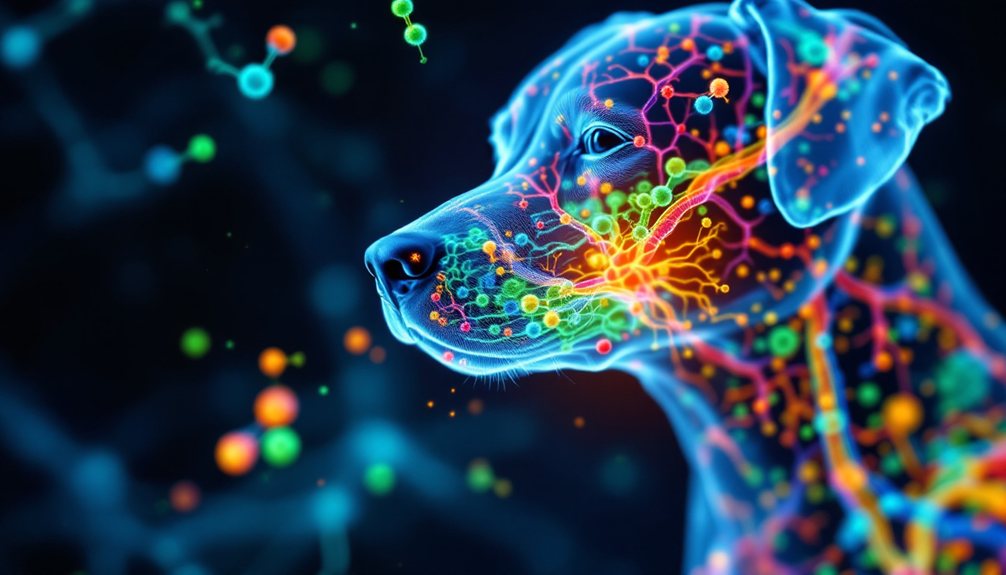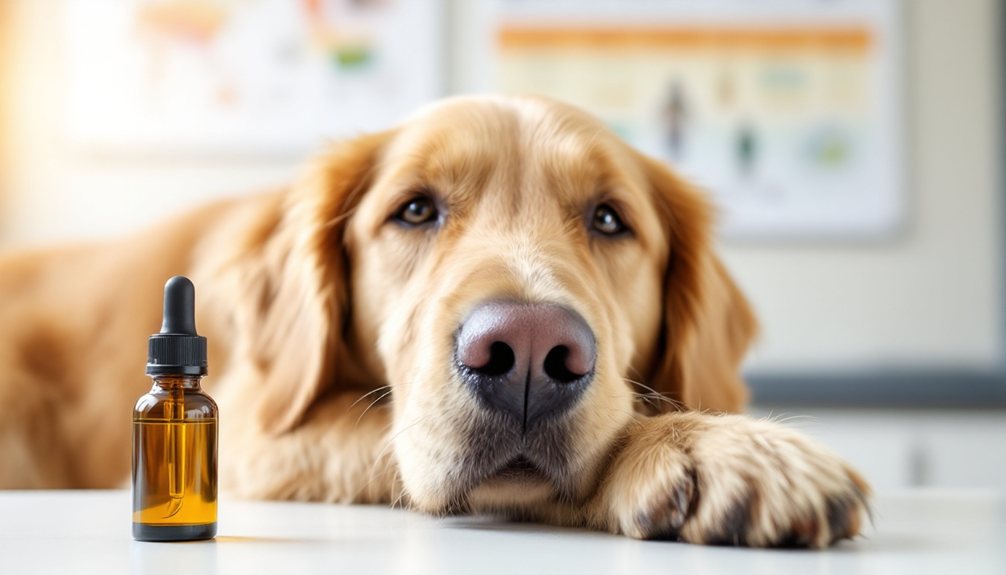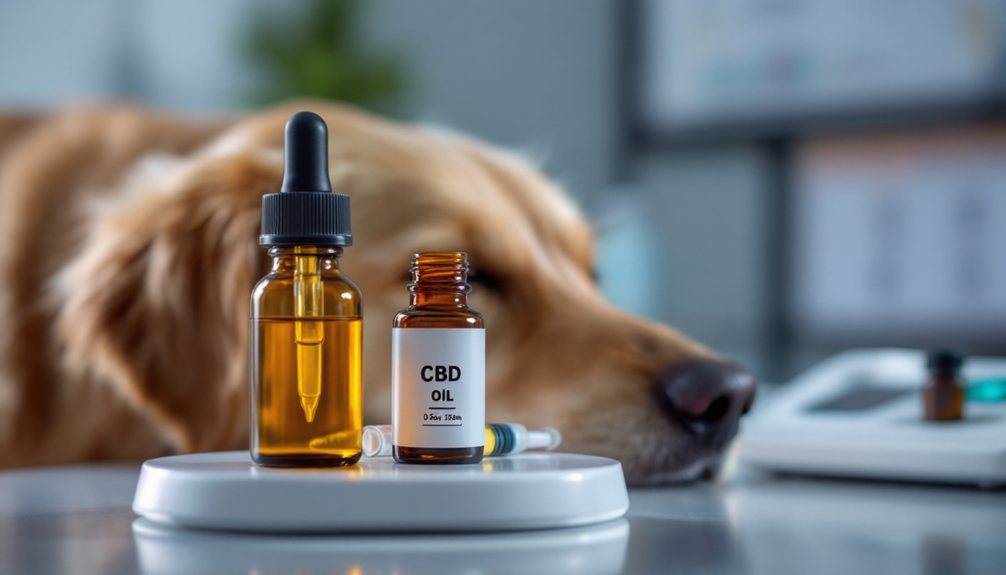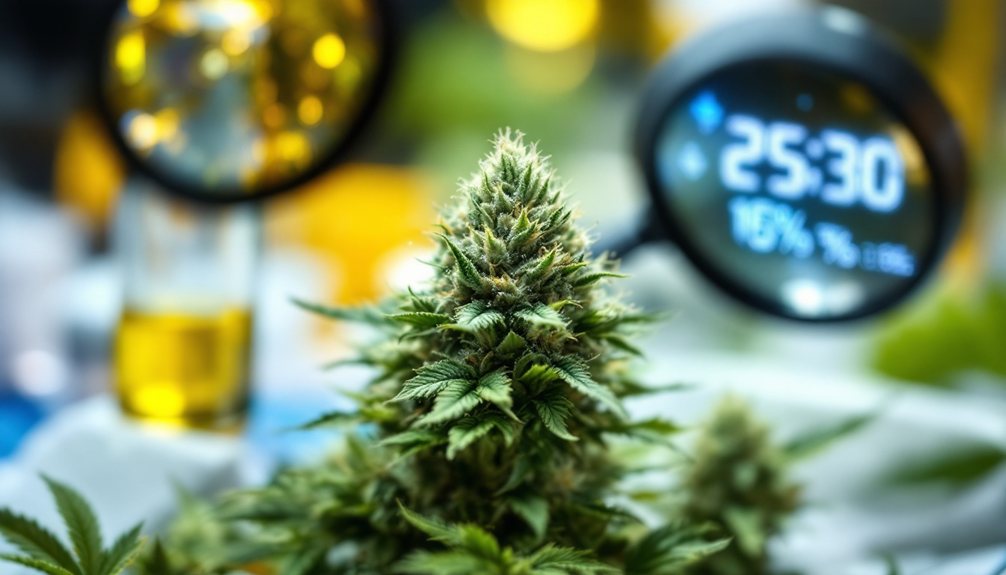Your pet’s health can benefit from CBD through its natural interaction with their endocannabinoid system (ECS), which regulates pain, inflammation, and mood. Research shows CBD may reduce anxiety, manage chronic pain, and control seizures in pets when properly dosed. You’ll need to choose high-quality, pet-specific products and work with your veterinarian to establish the right protocol. Understanding the science behind CBD will help you make informed decisions for your pet’s wellness journey.
Expert Highlights
- The endocannabinoid system in pets regulates crucial functions like mood, pain, and inflammation through CB1 and CB2 receptors throughout the body.
- Clinical research demonstrates CBD’s effectiveness in managing pet conditions including anxiety, seizures, chronic pain, and inflammation.
- Quality CBD products should have third-party testing, clear labeling, and THC content below 0.3% to ensure pet safety.
- Initial CBD dosing starts at 0.25mg per pound twice daily, with gradual adjustments based on pet response over 1-2 weeks.
- CBD interacts with pets’ endocannabinoid system to maintain homeostasis and improve overall wellness when properly administered.
Understanding the Endocannabinoid System in Pets

Just like humans, pets have a complex network of receptors throughout their bodies called the endocannabinoid system (ECS). This system helps regulate essential functions including mood, pain sensation, inflammation, and immune responses in your pet’s body.
Your pet’s ECS consists of two main receptor types: CB1 receptors primarily in the brain and nervous system, and CB2 receptors mainly in immune cells and peripheral tissues.
The endocannabinoid system features CB1 receptors in neural pathways and CB2 receptors in immune tissues, working together to regulate bodily functions.
These receptors interact with naturally produced endocannabinoids and plant-derived cannabinoids like CBD, helping maintain balance in your pet’s body.
Understanding your pet’s ECS can help you make informed decisions about CBD supplementation for their wellness needs.
Research-Backed Benefits of CBD for Animal Health

Growing scientific evidence supports CBD’s interaction with the endocannabinoid system to provide multiple health benefits for animals. Research shows CBD can help reduce inflammation, manage chronic pain, and decrease anxiety in pets.
Clinical studies demonstrate its effectiveness in controlling seizures and improving mobility in aging animals. You’ll find promising data on CBD’s ability to boost appetite in sick pets and reduce nausea during treatments.
Studies also indicate CBD may help manage allergies and skin conditions. While research continues to expand, current findings suggest CBD can enhance your pet’s quality of life when used as part of a thorough wellness plan.
Safety Considerations and Dosage Guidelines

While CBD offers numerous benefits for pets, proper dosing and safety protocols remain essential for ideal results. You’ll need to carefully monitor your pet’s response and adjust accordingly. Always start with the lowest recommended dose and gradually increase if needed.
| Weight Range | Starting Dose | Maximum Dose | Frequency |
|---|---|---|---|
| 1-15 lbs | 1mg | 5mg | 2x daily |
| 16-30 lbs | 2mg | 10mg | 2x daily |
| 31-60 lbs | 3mg | 15mg | 2x daily |
| 60+ lbs | 4mg | 20mg | 2x daily |
Watch for signs of drowsiness or digestive changes. Consult your veterinarian before starting CBD, especially if your pet takes other medications.
Choosing Quality CBD Products for Your Pet
Selecting high-quality CBD products for your pet requires careful research and attention to detail. Look for products that come with third-party lab testing certificates and clear ingredient lists.
Choose CBD oils extracted using CO2 methods, as they’re free from harmful solvents. Verify the THC content is below 0.3% to guarantee your pet’s safety.
Consider products specifically formulated for pets, rather than human CBD adapted for animal use. Check that the company provides transparent sourcing information about their hemp plants.
The packaging should include proper dosing instructions and batch numbers for traceability. Consult reviews from other pet owners and veterinary professionals.
Clinical Applications and Treatment Protocols
Recent clinical studies have shown CBD’s potential benefits for various pet health conditions, including anxiety, arthritis, seizures, and chronic pain.
When starting CBD treatment for your pet, begin with a low dose of 0.25mg per pound of body weight twice daily. Monitor your pet’s response for 1-2 weeks before adjusting.
For acute anxiety, you can increase dosing 30 minutes before stressful events. For arthritis and chronic pain, consistent twice-daily dosing works best.
Keep a detailed log of your pet’s symptoms, behaviors, and responses to CBD. This information helps you and your veterinarian optimize the treatment protocol for maximum therapeutic benefit.
Frequently Asked Questions
Can CBD Make My Pet High or Addicted?
No, CBD won’t get your pet high since it doesn’t contain THC. You also don’t need to worry about addiction – CBD isn’t habit-forming and won’t create physical dependence in pets.
How Long Does It Take to See Results From CBD Treatment?
You’ll typically notice CBD effects in your pet within 30-60 minutes for acute issues, while chronic conditions may need 2-4 weeks of consistent treatment to show meaningful improvement.
Will CBD Interact With My Pet’s Current Medications?
You’ll need to consult your veterinarian, as CBD can interact with several medications, especially those metabolized by the liver. Don’t start CBD without discussing it with your pet’s doctor.
Can I Give My Pet Human CBD Products?
You shouldn’t give human CBD products to your pet. They’re formulated differently and may contain harmful ingredients. Always choose pet-specific CBD products that are properly dosed for your animal’s size.
Should I Tell My Veterinarian if I’m Giving My Pet CBD?
You should always inform your veterinarian about CBD use, as it may interact with other medications and affect treatment plans. Being transparent helps your vet provide the best care possible.
Expert Final Thoughts
You’ve learned how CBD works with your pet’s endocannabinoid system and its research-supported benefits for various conditions. Remember to choose high-quality products, start with conservative doses, and monitor your pet’s response. While CBD shows promise for pet wellness, always consult your veterinarian before starting treatment, as they’ll help determine if it’s right for your furry friend’s specific needs.





Join the Discussion